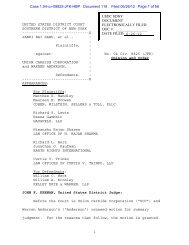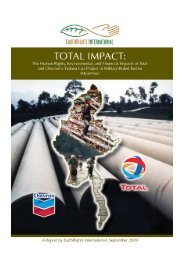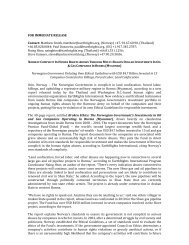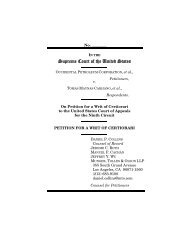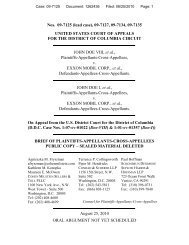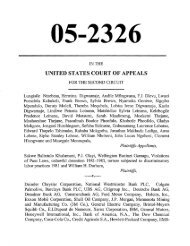The Oil Industry and Human Rights in the Niger Delta - EarthRights ...
The Oil Industry and Human Rights in the Niger Delta - EarthRights ...
The Oil Industry and Human Rights in the Niger Delta - EarthRights ...
Create successful ePaper yourself
Turn your PDF publications into a flip-book with our unique Google optimized e-Paper software.
In 2002, <strong>Human</strong> <strong>Rights</strong> Watch noted that Shell had “undertaken a major review of itsattitude toward communities <strong>and</strong> issues of human rights <strong>and</strong> susta<strong>in</strong>able development”follow<strong>in</strong>g <strong>the</strong> execution of Ken Saro-Wiwa. 57 However, although “Shell has madeserious efforts to improve its performance <strong>in</strong> <strong>Niger</strong>ia . . . <strong>the</strong>se efforts have <strong>in</strong> too manyareas yet to yield mean<strong>in</strong>gful results on <strong>the</strong> ground. . . . For <strong>the</strong> villager liv<strong>in</strong>g near Shell'sfacilities <strong>in</strong> <strong>the</strong> <strong>Niger</strong> <strong>Delta</strong>, little if anyth<strong>in</strong>g has changed: too often, oil spills still destroyfarm<strong>in</strong>g l<strong>and</strong> or fish<strong>in</strong>g grounds <strong>and</strong> remediation is poor; state security forces deployed toShell’s facilities cont<strong>in</strong>ue to harass people <strong>in</strong>discrim<strong>in</strong>ately; <strong>and</strong> <strong>the</strong> benefits of <strong>the</strong> oil<strong>in</strong>dustry are still channeled to a small elite.” 58 Shell has yet to resume oil production <strong>in</strong>Ogonil<strong>and</strong>.Chevron <strong>and</strong> <strong>the</strong> Parabe IncidentFollow<strong>in</strong>g <strong>the</strong> Ogoni crisis, one of <strong>the</strong> best-documented <strong>in</strong>cidents of abuses aga<strong>in</strong>st oilprotesters is <strong>the</strong> 1998 attack on a demonstration at Chevron’s Parabe platform. In this<strong>in</strong>cident, Chevron did precisely what Shell vowed never to do after Umuechem—itexpressly called on <strong>the</strong> military <strong>and</strong> <strong>the</strong> mobile police to respond to a demonstration.Chevron had previously had its own direct experience with <strong>the</strong> military’s use of forceaga<strong>in</strong>st protestors. In May 1994, when protestors used boats to blockade Chevronfacilities at Opuekeba <strong>in</strong> Ondo State, <strong>the</strong> <strong>Niger</strong>ian security forces responded by send<strong>in</strong>g abarge <strong>in</strong> that sunk sixteen boats, kill<strong>in</strong>g three people by drown<strong>in</strong>g <strong>and</strong> caus<strong>in</strong>g o<strong>the</strong>r<strong>in</strong>juries. 59 When Ilaje communities engaged <strong>in</strong> protests several years later, Chevronknew of <strong>the</strong> security forces’ propensity to violence.<strong>The</strong> Ilaje are a small ethnic group of <strong>Niger</strong>ians, many of whom live <strong>in</strong> relatively remoteswampl<strong>and</strong>s <strong>and</strong> river areas <strong>in</strong> Ondo State <strong>in</strong> <strong>the</strong> southwest <strong>Niger</strong> River delta region.Many of <strong>the</strong>se communities can only be accessed from <strong>the</strong> air or by water. Ilajel<strong>and</strong>, as itis called, has been severely disrupted by Chevron’s operations <strong>and</strong> <strong>the</strong> environmentaldamage it has caused; <strong>the</strong> destruction of <strong>the</strong> local environment has meant great hardship<strong>and</strong> unemployment for many Ilaje people, as well as <strong>the</strong> loss of traditional food supplies.Saltwater <strong>in</strong>cursions have devastated freshwater fish stocks, killed vegetation, <strong>and</strong>destroyed sources of potable water. 60 Gas flar<strong>in</strong>g has caused dangerous air pollution <strong>and</strong>acid ra<strong>in</strong> that eats through metal roofs. 61 Bola Oy<strong>in</strong>bo, an Ilaje community leader,described <strong>the</strong> impacts: “Go to Awoye community <strong>and</strong> see what <strong>the</strong>y have done.Everyth<strong>in</strong>g <strong>the</strong>re is dead: mangroves, tropical forests, fish, <strong>the</strong> freshwater, wildlife. Allkilled by Chevron. . . . At Abiteye, Chevron discharges hot effluent <strong>in</strong>to <strong>the</strong> creeks. Ourpeople compla<strong>in</strong> of ‘dead creeks.’” 6257 <strong>Human</strong> <strong>Rights</strong> Watch, “<strong>The</strong> <strong>Niger</strong> <strong>Delta</strong>: No Democratic Dividend,” at 30 (Oct. 2002).58 Id. at 31.59 <strong>Human</strong> <strong>Rights</strong> Watch / Africa, “<strong>Niger</strong>ia: <strong>The</strong> Ogoni Crisis: A Case-Study of Military Repression <strong>in</strong>Sou<strong>the</strong>astern <strong>Niger</strong>ia,” at 33 (July 1995).60 Deposition of Monday Omosaye <strong>in</strong> Bowoto v. Chevron Corp. at 17:3-14, 19:13-20 (Aug. 18, 2005);deposition of Chief Nicholas Omomowo <strong>in</strong> Bowoto v. Chevron Corp. at 342:15-344:10 (Jan. 28, 2005).61 Deposition of Philemon Ebiesuwa <strong>in</strong> Bowoto v. Chevron Corp. at 152:18-157:12 (July 12, 2005).62 Interview with Bola Oy<strong>in</strong>bo.Page 13 of 29



